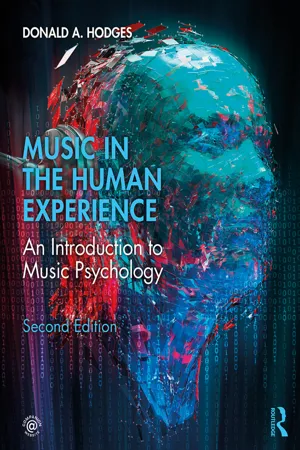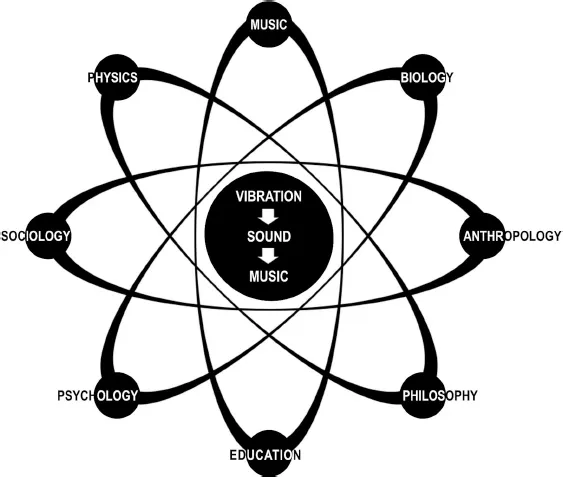
eBook - ePub
Available until 3 Feb |Learn more
Music in the Human Experience
An Introduction to Music Psychology
This book is available to read until 3rd February, 2026
- 472 pages
- English
- ePUB (mobile friendly)
- Available on iOS & Android
eBook - ePub
Available until 3 Feb |Learn more
About this book
Music in the Human Experience: An Introduction to Music Psychology, Second Edition, is geared toward music students yet incorporates other disciplines to provide an explanation for why and how we make sense of music and respond to it—cognitively, physically, and emotionally. All human societies in every corner of the globe engage in music. Taken collectively, these musical experiences are widely varied and hugely complex affairs. How did human beings come to be musical creatures? How and why do our bodies respond to music? Why do people have emotional responses to music? Music in the Human Experience seeks to understand and explain these phenomena at the core of what it means to be a human being.
New to this edition:
- Expanded references and examples of non-Western musical styles
- Updated literature on philosophical and spiritual issues
- Brief sections on tuning systems and the acoustics of musical instruments
- A section on creativity and improvisation in the discussion of musical performance
- New studies in musical genetics
- Greatly increased usage of explanatory figures
Frequently asked questions
Yes, you can cancel anytime from the Subscription tab in your account settings on the Perlego website. Your subscription will stay active until the end of your current billing period. Learn how to cancel your subscription.
No, books cannot be downloaded as external files, such as PDFs, for use outside of Perlego. However, you can download books within the Perlego app for offline reading on mobile or tablet. Learn more here.
Perlego offers two plans: Essential and Complete
- Essential is ideal for learners and professionals who enjoy exploring a wide range of subjects. Access the Essential Library with 800,000+ trusted titles and best-sellers across business, personal growth, and the humanities. Includes unlimited reading time and Standard Read Aloud voice.
- Complete: Perfect for advanced learners and researchers needing full, unrestricted access. Unlock 1.4M+ books across hundreds of subjects, including academic and specialized titles. The Complete Plan also includes advanced features like Premium Read Aloud and Research Assistant.
We are an online textbook subscription service, where you can get access to an entire online library for less than the price of a single book per month. With over 1 million books across 1000+ topics, we’ve got you covered! Learn more here.
Look out for the read-aloud symbol on your next book to see if you can listen to it. The read-aloud tool reads text aloud for you, highlighting the text as it is being read. You can pause it, speed it up and slow it down. Learn more here.
Yes! You can use the Perlego app on both iOS or Android devices to read anytime, anywhere — even offline. Perfect for commutes or when you’re on the go.
Please note we cannot support devices running on iOS 13 and Android 7 or earlier. Learn more about using the app.
Please note we cannot support devices running on iOS 13 and Android 7 or earlier. Learn more about using the app.
Yes, you can access Music in the Human Experience by Donald A. Hodges in PDF and/or ePUB format, as well as other popular books in Media & Performing Arts & Music. We have over one million books available in our catalogue for you to explore.
Information
Part I
Introducing Music Psychology
Welcome to the world of music psychology. It is my pleasure to serve as your guide as we explore this diverse and fascinating field of study. Four chapters provide the initial introduction, connections between philosophy and music psychology, a look at the evolutionary basis for human musicality, and a broad survey of musical behaviors from around the globe. In Chapter 1: What is Music Psychology?, you will be introduced to a model of music psychology and then we will go on a brief tour of major disciplines that contribute to the field. You will also be directed to Appendix A, a listing of selected major works in music psychology from the 19th century to the present that provide a sense of how scholars have addressed different topics over time.
When music psychologists conduct research, they do so from a philosophical orientation, whether explicit or implied. In Chapter 2: Philosophical Issues in Music Psychology, we will explore relationships between the two disciplines. Although philosophical orientations are not always readily apparent, they can have a significant impact on how we interpret and understand research findings. Some topics, such as beauty and human nature, are best, or perhaps only, understood from a combined perspective of philosophy and psychology.
Do you think that human musicality has an evolutionary basis? Are we musical creatures because music provided a survival benefit? Do other animals make music? That is, are bird songs and whalesongs really music? We will investigate these issues in Chapter 3: How We Came to be Musical.
Human beings in every place and at all times have participated in musical activities. In Chapter 4: Music Around the World and Across Time, we will review the archaeological evidence for ancient music making and read about the kinds of musical behaviors that characterize different cultural groups around the world.
The goal of these first four chapters is to help you understand what music psychology is and to place it in a broad context. Armed with this knowledge, the study of more particular aspects of music psychology such as music perception and cognition will be more meaningful.
Chapter 1
What Is Music Psychology?
Let us begin our journey into the world of music psychology by considering how an old soldier described his experience during the Second Boer War in South Africa (1899–1902):
I was in a Highland Regiment, as you know—the Scots Guards—and I’ll tell you something: there is nothing in the world like the sound of the bagpipes to raise a man’s morale, to lift his spirits, and give him strength. However tired and thirsty we were, the bagpipes at the front of the column only had to strike up and within seconds you felt your feet lift off the ground, your step lighten, your spirits rise, and every man-Jack was marching strong, in rhythm to the pipes.
(Worth, 2013, pp. 250–251; see Fig. 1.1)

Figure 1.1 | Bagpipes Band at the 2017 AFL Grand Final Parade on September 29, 2017, in Melbourne, Victoria.
How are we to account for this power of music to enliven weary soldiers? Gaston (1968) implied that there are rational explanations when he wrote, “Music is not mystical; it is mysterious” (p. 10). We may not have the answers yet, but it is the work of the music psychologist to provide scientifically based answers. So, our first glimmer of what music psychology is all about is that music psychologists ask and answer questions. Here are a few illustrative questions they might seek to answer:
- How did human beings come to be musical creatures?
- Do some animals make music, too? (Are birdsong and whalesong really music?)
- Are there universals in music such that all people, everywhere, organize musical sounds in similar ways?
- How does our sense of hearing work?
- Are there specific parts of the brain devoted to music, just as there might be for language or mathematics?
- How and why do our bodies respond to music and can we harness these reactions to affect changes in health or behavior?
- Can we explain why people have such strong emotional responses to music?
- Do different kinds of musicians have different kinds of personalities?
- How is it that music can bring people together and unite them or conversely divide them into different cliques?
- What is happening inside a pianist’s mind as he or she plays a Beethoven sonata?
- How can harp music restore balance to a young patient’s vital signs in the middle of surgery?
- How can a person have a cognitive disorder and still excel at playing the guitar?
As we will explore later, all human societies—in every place on the planet and at all times in history—engage in musical behaviors. In fact, human beings all over the world engage in music to such an extent that many consider music to be a species-specific trait (Blacking, 1973). Taken collectively, these musical experiences are widely varied, hugely complex affairs and it is the job of music psychologists to understand and explain this phenomenon that seems to be so central to what it means to be a human being.
The sample questions given above are just the tip of the iceberg. Interested scholars have pondered and conducted research on hundreds (thousands?) of such questions. In the earliest days, dating even back to the ancient Greeks, most of the questions were approached philosophically, although Pythagoras did conduct experiments as early as the sixth century BC. More recently, researchers have utilized very sophisticated laboratory technologies, statistical analyses, and other means to arrive at answers. It is the job of the music psychologist to bring some order to the myriad pieces of information that need to be connected into a coherent understanding of all the ways we are musical. As a guide to exploring topics that range over a broad range of human knowledge, we will use a model developed by Charles Eagle (1996).
As you can see in Figure 1.2, Eagle arrayed a broad range of disciplines around a central core. Quantum physics tells us that everything that exists, exists in a state of vibration. Even though the chair you are sitting on as you read this page feels solid, if you move down to the molecular, and even deeper quantum level, there is more space than matter and the matter is in constant movement. Some vibrations are perceived as sound—nominally those between 20 and 20,000 cycles per second for humans—and some sounds are perceived as music. The model indicates that we can consider music from a number of disciplines but also from an interdisciplinary standpoint. Thus, we might say more formally that music psychology is a multidisciplinary and interdisciplinary study of music in the human experience.

Figure 1.2 | Descriptive Model of the Interdisciplinary World of Music Psychology.
A Brief Tour of the Model of Music Psychology
As an expansion of the foregoing definition of music psychology, let us take a brief tour around the model, looking briefly at the major disciplines involved. We will start with Biology on the upper right and move clockwise around the outside, finishing with Music.
Contributions from Biology
Musical experiences are bodily experiences and understanding them requires investigations into such biological topics as the brain, hearing, vision, emotions, motor mechanisms, and physiological responses, such as heart rate changes (Chapters 3, 6, 9, 10, 13, and 15). BioMusic is a term used to study animal sound making, such as birdsong, and the relationship this has with human music.
Here are representative publications in the biology of music:
- Biomusicology: Neurophysiological, Neuropsychological and Evolutionary Perspectives on the Origins and Purposes of Music (Wallin, 1991)
- The Biology of Musical Performance and Performance-related Injury (Watson, 2009)
- The Biological Foundations of Music (Zatorre & Peretz, 2001)
- The Oxford Handbook of Music and the Brain (Thaut & Hodges, 2019)
Contributions from Anthropology
Anthropologists have a message for us that can be stated rather simply but which is profound in its impact on our understanding of the significance of music: All people in all times and in all places have engaged in musical behaviors. Elaborating on this theme takes us around the world as well as back in time. Archaeologists search for evidence of ancient musical practices, and ethnomusicologists seek to document the role of music in all the world’s cultures (Chapter 4).
Here are representatives of the literature in the anthropology and ethnomusicology of music:
- The Anthropology of Music (Merriam, 1964)
- Comparative Musicology and Anthropology of Music (Nettl & Bohlman, 1991)
- Oxford Handbook of Medical Ethnomusicology (Koen, 2008)
- Ethnomusicology: A Very Short Introduction (Rice, 2014)
Contributions from Philosophy
Philosophical inquiry into the phenomenon of music has most often been concerned with the nature and meaning of music, the understanding of beauty, and our emotional responses to music (Chapter 2). Philosophical perspectives may influence how one interprets scientific data.
Here are some representative publications in music philosophy:
- In Search of Beauty in Music: A Scientific Approach to Musical Esthetics (Seashore, 1947)
- Aesthetics and Psychobiology (Berlyne, 1971)
- Music and Mind: Philosophical Essays on the Cognition and Meaning of Music (Fiske, 1990)
- A Concise Survey of Music Philosophy (Hodges, 2017)
Contributions from Education
Music has been part of the American educational system since 1838, when Lowell Mason convinced the Boston School Board to accept it as part of the curriculum (Birge, 1928). Although there is no national curriculum for music, the National Standards for Music Education (2014) specify what students should know and be able to do in music. Music is considered a core academic subject (Camera, 2015). Those who are interested in conducting research on the role of music in the broader educational context might belong to the Music Special Interest Group (SIG) of the American Educational Research Association (AERA). The purpose of this group is “to improve the quality of research conducted in the music education field” (2007). Researchers who wish to study music in the context of the other arts disciplines can become affiliated with two additional AERA SIGs: Arts and Learning and Arts-Based Approaches to Educational Research. In all of this, there is a central focus on music teaching and learning (see Chapter 14).
Here a few representative publications in music education relevant to music psychology:
- The MENC Handbook of Research on Music Learning, 2 vols. New York: Oxford University Press. (Colwell & Webster, 2011)
- The Oxford Handbook of Music Education, 2 vols. Oxford, UK: Oxford University Press. (McPherson & Welch, 2012)
- Music and Music Education in People’s Lives (McPherson & Welch, 2018)
- The Routledge International Handbook of Music Psychology in Education and the Community (Hallam, Creech, & Hodges, 2020)
Contributions from Psychology
Psychologists explore an immense number of topics related to music. Psychologists from each of the major approaches (e.g., behavioral, cognitive, developmental, Freudian, Gestalt, humanistic, etc.) contribute unique understandings of musical experiences. Psychologists are interested in the perception and cognition of music. They want to know how we make sense of musical experiences. Other important topics include the musical personality, special musicians (e.g., musical savants, Williams Syndrome musicians, etc.), the development of musicality, performance anxiety, affective responses to music, musical aptitude, and music teaching and learning (Chapters 7, 8, 11, 12, 13, and 14).
Here are some representative publications from the field of psychology:
- Psychology of Music (Tan, Pfordresher, & Harré, 2010)
- The Oxford Handbook of Music Psychology (Hallam, Cross, & Thaut, 2016)
- Psychology of Music (Hallam, 2018)
- The Psychology of Music: A Very Short Introduction (Margulis, 2019)
Contributions from Sociology
Some sociologists are interested in the role music plays in social interactions. They tell us that each individual has the potential to respond to music of the surrounding culture. No condition of age, race, gender, mental or physical state, or socioeconomic status prohibits one from a meaningful musical experience. The sociology of music takes us into business and economics, politics, religion, the military, youth culture, and the entertainment and media industries (Chapter 16).
Here are some representative publications in the sociology of music:
- The Sociology of Music (Dasilva, Blasi, & Dees, 1984)
- Music, Culture, and Society (Scott, 2000)
- The Social and Applied Psychology of Music (North & Hargreaves, 2008)
- Music: A Social Experience (Cornelius & Natvig, 2012)
Contributions from Physics
Acoustics, a branch of physics, is the science of sound and provides a fundamental basis for understanding the sonic aspects of music (Chapter 5). From acoustics, further investigations lead to psychoacoustics (a branch of psychophysics; Chapter 7) or how the mind interprets (musical) sound. Practical applications of acoustics are made in architecture and engineering, and the physics of musical instruments leads to ergonomics and biomechanics.
Here are some sample books on the physics of music:
- Introduction to the Physics and Psychophysics of Music (Roederer, 1975)
- The Physics of Music (Wood, 1980)
- Measured Tones: The Interplay of Physics and Music (Johnston, 2002)
- The Jazz of Physics (Alexander, 2016)
Contributions from Music
Many musicians would perhaps rather compose, conduct, perform, or analyze music than investigate it scientifically. However, music researchers have made many significant contributions to the understanding of the phenomenon of music in a variety of fields.
Music theorists have led the way in showing how structural elements of music influence our perceptions (Chapter 8). Ethnomusicologists explore the ways all human cultures are musical (Chapter 4). Although in the United States the term “musicology” frequently is used synonymously with the phrase “music history,” in fact musicologists are expanding their purview into such interdisciplinary fields as comparative musicology, evolutionary musicology, and cognitive musicology. Those interested in musical performance have investigated a variety of related topics such as the acquisition of motor skills and strategies for learning music (Chapter 13). Music therapists investigate the role of music in a wide variety of client populations, such as cognitively or physically impaired individuals (Chapter 15). Music educators have had a particular invol...
Table of contents
- Cover
- Half Title
- Title
- Copyright
- Contents
- Media Tutorials
- Illustrations
- Preface
- Acknowledgments
- Part I: Introducing Music Psychology
- Part II: Perceiving, Understanding, and Responding to Music
- Part III: Being Musical
- Appendix A
- Glossary
- Illustration Credits
- References
- Index